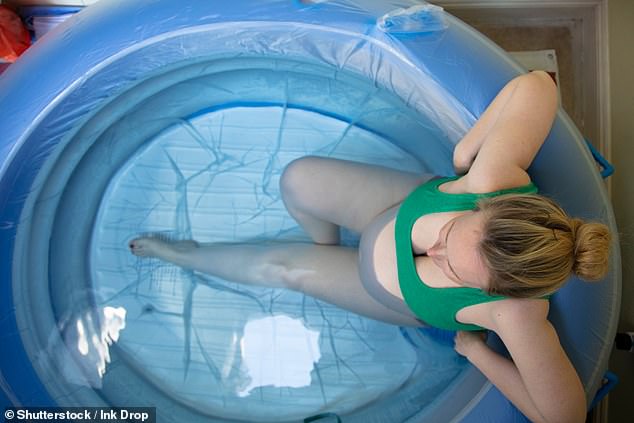Water births do not increase the risk of complications for mother or baby, NHS research shows.
Women with low-risk pregnancies are as likely to experience healthy births in a supervised pool as those on beds, they found.
Experts say it could have implications for thousands of women each year who use birthing pools as a form of pain relief during labour.
The study analysed more than 87,000 records who used a pool during labour across 26 NHS organisations in England and Wales between 2015 and 2022.
Researchers explored the rate of baby deaths, severe tears suffered by women during childbirth, as well as the number of babies who needed antibiotics or help with breathing on a neonatal unit after birth.
Researchers claim the risks of complications were no higher among water births compared with births out of water
In the UK around 60,000 women a year use a birth pool or bath for pain relief in labour, but some midwives and doctors were concerned that water births could carry extra risks.
But the new research, published in obstetrics and gynaecology journal BJOG, found these were no higher among water births compared with births out of water.
Julia Sanders, a professor of clinical Midwifery at Cardiff University, said: ‘There have been reports that babies could become seriously ill, or even die, after water births, and that mothers were more likely to have severe tears or heavy blood loss.
‘We wanted to establish if water births with NHS midwives are as safe as giving birth out of water for women and their babies at low risk of complications.’
The analysis found one in 20 first time mothers had a severe tear compared to one in 100 mothers having a second, third or fourth baby.
Three in every 100 babies needed antibiotics or help with breathing, while deaths were rare – seven were recorded in the water birth group compared to six among those who gave birth out of water.
Rates of Caesarean section were also low at under 6 per cent for first time mothers and under 1 per cent for mothers having their second, third or fourth baby.
Professor Sanders said the findings, scientifically establish that giving birth in water was ‘not associated with an increase in risk for mother and baby‘.
Peter Brocklehurst, emeritus professor of women’s health at the Birmingham Clinical Trials Unit, said: ‘Given that 10 per cent of women use immersion in water as pain relief in labour, the results of this study will have implications for thousands of women a year in the UK and many more around the world, where immersion in water during labour is common practice.’
Professor Chris Gale, a consultant neonatologist at Chelsea and Westminster NHS Foundation Trust in London, added: ‘Many paediatricians and neonatologists worry that births in water might carry extra risks for babies, but the study found convincing evidence that for women with an uncomplicated pregnancy this is not the case.’
Source: Mail Online
